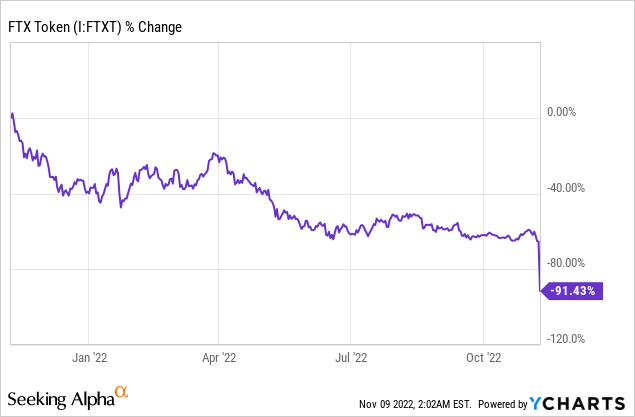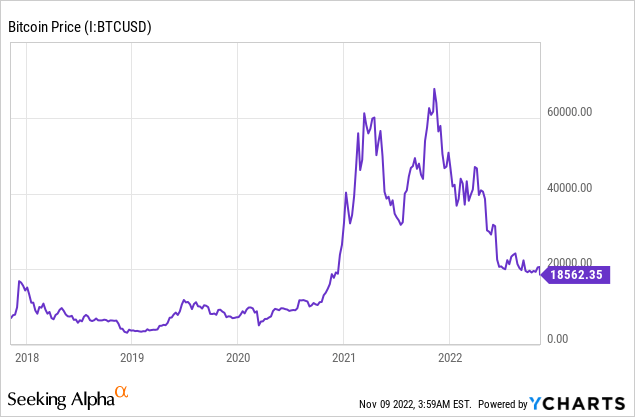Philip Thurston/E+ via Getty Images
What The Heck Happened to FTX?
While the world was busy with U.S. midterm elections, the crypto world was rocked by a multi-billion dollar run on the exchange FTX, formerly valued at $32 billion. Bitcoin (BTC-USD) was down 14% at one point, while FTX’s token (FTT-USD) plummeted by 80% on relatively low volume (in my opinion) given the magnitude of the crash.
FTX is best known for its Bahamas-based billionaire founder, Sam Bankman-Fried. Over the last 6 months, Sam Bankman-Fried has testified before Congress about Bitcoin regulation, bought 7.6% of Robinhood (HOOD), bailed out Voyager Digital (OTCPK:VYGVQ), and donated nearly $40 million to various political races. But now, FTX may have been a house of cards all along after depositors pulled $6 billion and it suspended customer withdrawals. Thankfully, the small part of FTX that operates onshore in the U.S. seems to be operating normally for now. Before this, Bankman-Fried had been compared to J.P. Morgan (the man, not the bank) as a savior to the industry. A potential bailout for FTX customers by rival exchange Binance (BNB-USD) is now in the works, but it’s not bound to buy the company if the balance sheet turns out worse than it thought, and as of Wednesday morning, that was looking like a distinct possibility.

So what happened? Sam Bankman-Fried (a.k.a. SBF) recently became embroiled in an increasingly bitter Twitter (TWTR) feud with Binance founder and fellow crypto billionaire Changpeng Zhao (a.k.a. CZ). Zhao operates out of Singapore, and unlike SBF, cultivates an image as more of a rebel- almost entirely eschewing the idea of onshore regulation. The public feud is especially unusual because Binance/Zhao was previously a large investor in FTX, and took ~$2 billion in FTX’s token when they later divested.
Friends No More: Sam Bankman-Fried and Changpeng Zhao (Twitter)
Zhao and Bankman-Fried have had no love lost for a while now, but things seem to have heated up when Bankman-Fried seemed to imply in a tweet late last month that Zhao may be unable to physically come to the United States- which I’m guessing is an allusion to the ongoing investigation of Binance for money laundering. Zhao has claimed that Bankman-Fried was lobbying Congress against competitors like Binance behind their backs. But the tables soon turned. Not long after, an article came out citing leaked documents detailing the possibility that much of SBF’s assets in his main company, Alameda Research, were tied up in highly illiquid assets while his liabilities could potentially be called, threatening FTX as well. Since then, independent analysis of the FTT token’s liquidity paints a troubling picture as well.
Zhao’s response- he would sell his stake in Bankman-Fried’s FTT token. Bankman Fried’s second-in-command then said they’ll buy the tokens back for $22. Zhao called the bluff and started unloading hundreds of millions of dollars of coins on the open market. But while SBF was a deca-billionaire on paper, his team didn’t have the cash liquid to defend the $22 level. Not having the money to defend the peg on FTT then sparked a giant bank run on FTX, with depositors reportedly pulling $6 billion in assets in just 3 days. As of yesterday, FTX has suspended withdrawals. Insane!
And not having the money here creates the rebuttable presumption that despite being hailed as a financial genius by the media, Bankman-Fried’s empire may have been fueled in large part by risky bets with depositor money. This is a really bad look, especially considering the wild spending on acquisitions, political contributions, and sponsorships of NBA, MLB, and Formula 1 racing. SBF even tried to co-invest in Elon Musk for the Twitter buyout but was rejected by Musk. FTX recently raised $420 million from investors, led by the Ontario Teacher’s Pension Fund. That money is likely gone forever. Bloomberg has estimated in a back-of-the-envelope calculation that 94% of Bankman-Fried’s net worth has now been “eviscerated”. So what will happen to FTX? Bankman-Fried went silent on Twitter after days of vocally defending FTX. Then after getting slammed with withdrawals, SBF tweeted that Binance is entering a “strategic transaction” with FTX to buy the offshore part of FTX that represents the vast majority of the company’s total operations.
Binance Bailout: Will Binance Buy FTX?
Probably. But then again, maybe not.
The wording of the tweet and the thread below it offering a “huge thank you” make it seem like an apology was demanded by CZ’s team. Strategic transaction in this case means a fire sale like the one where Bear Stearns was bought for $2 per share after trading for $150. SBF bailed out BlockFi and Voyager Digital this summer for pennies on the dollar, and now the hunter has become the prey. How much is FTX worth? A few months ago, it was valued at $32 billion. Now it might be worth zero if it’s not bailed out, or it might be worth whatever Binance agrees to pay for it.
So is this legal? It probably wouldn’t be in the U.S., at least not for banks or broker-dealers. Spreading rumors about competing banks is understood to threaten the whole system. But in the offshore crypto world, people tend to be based in jurisdictions that take a more relaxed view of these sorts of things as long as the money is flowing.
In some ways, this is genius for Zhao because he called a competitor’s bluff on having liquidity and essentially got FTX’s business for free. The deal is so good for Zhao that he gets to now do due diligence and either re-trade or back out of the deal if he finds the financials are worse than expected. Remember that shotgun weddings between firms in 2008 almost brought down several banks, most notably Bank of America (BAC) after they absorbed Countrywide Financial. But in other ways, it’s problematic. Binance is the largest crypto exchange in the world. That means if Binance subsequently runs into trouble, there’s no one to rescue it. Bankman-Fried famously said in July that the shoes had all dropped. Scarcely more than 100 days later, FTX’s shoes were the ones to drop. The irony is thick here. Were their assets really that concentrated in a bunch of altcoins and their liabilities in US dollars? I suppose we will soon find out more.
How Does The FTX Scandal Impact Bitcoin?
SBF likely owns a lot of Bitcoin, so he’s going to be a forced seller.
That’s going to put a bunch of pressure on BTC in the coming days. He owns a lot of Robinhood as well, so that’s probably going to be on the sale block. He probably will be dumping U.S. Treasuries too (the Treasury market can handle it) and a bunch of other random assets. I’d assume that FTT will suffer the same fate as Terra (LUNA-USD) and that it will be worth close to zero.

There’s a very important distinction that may be lost in the hoopla around the possible insolvency and bailout of FTX. Bitcoin is a decentralized algorithm that allows people to store value on the blockchain. The vast majority of these slick “innovations,” charismatic founders, and pyramid schemes are coat-tailing the massive success that Bitcoin has had by offering an alternative to central bank currency. By and large, altcoins are not the real deal though. Seeking Alpha contributor Lyn Alden Schwartzer recently called them “clown bucks.”
I’ll give them credit- a lot of these guys are slick. While there’s yet no clear and convincing evidence of anything criminal happening at FTX, crypto hustlers fooled pension funds, fooled Congress in some cases, and as with BlockFi, they fooled me and my friends, although thankfully I redeemed my money before the crisis. There are many legitimate opportunities to add value in the world, but crypto seems that it may have attracted some of the shadiest people. This isn’t inherently Bitcoin’s fault- recently we’ve seen how Bitcoin has lent a lifeline to groups of people living under Lebanon’s collapsing government. A recent CNBC piece profiled a 22-year-old running a Bitcoin mining operation off of hydropower, solar panels, and fuel. When done right, Bitcoin is a tool of freedom. When done wrong, Bitcoin is exchanged to buy gambling chips at the altcoin casino. The last few months have made it abundantly clear that there needs to be reform on the crypto exchange side (to prevent hacks and exchange implosions), and on the regulatory side as well. These efforts are ongoing.
Bottom Line
Massive crypto exchange FTX is on the brink of collapse, suspended withdrawals, and is awaiting rescue via a fire sale to competitor Binance. High-profile investors like big Silicon Valley venture firms and public pension funds are likely going to lose a ton of money on FTX. You can bet your bottom dollar that criminal and civil investigations have likely already begun in the US and in other countries into how FTX collapsed. Yet another shoe has dropped in the altcoin world, and it likely won’t be the last. I do view further failures of altcoins and stablecoins as possibly representing an opportunity to buy Bitcoin for those who believe in the long-term potential. But these events are a very clear warning sign for investors to get out of stablecoins and altcoins before it’s too late. Bitcoin will come back, but the money in these crazy DeFi schemes and altcoins is likely going to end up missing after a tragic game of musical chairs.
What do you think? Feel free to share your thoughts, comments, or any insight you have into the FTX situation below!


Be the first to comment